Are you considering purchasing a solar generator for your next outdoor adventure or emergency backup power source? With the increasing popularity of solar power, the market is flooded with options, making it overwhelming to choose the right one. In this article, we will share with you 10 tips to help you choose the right portable solar generator for your needs.
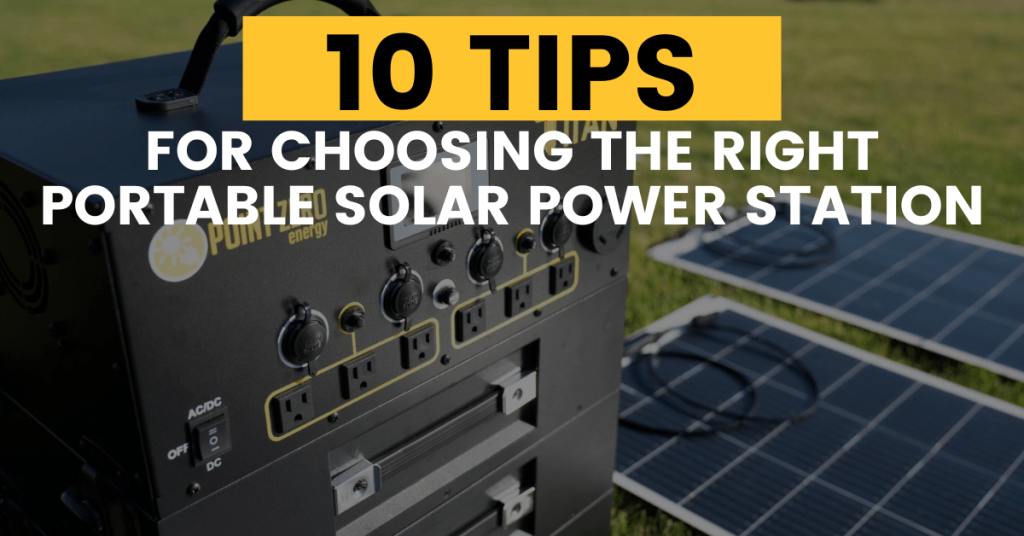
The first step in choosing the right portable solar generator is to determine your power needs. Consider the devices you will be powering and their power consumption. Look for a solar generator that can handle the total power consumption of your devices.
When selecting a portable solar generator, it’s a good idea to choose one with a little extra capacity to ensure you have enough power in case your needs change or unexpected power outages occur. With a little bit of research and consideration, you can choose the right portable solar generator that meets your power needs and provides reliable, clean energy.
Battery capacity is one of the most important factors to consider when choosing a portable solar generator. The battery capacity determines how long the power station can power your devices, and it is measured in watt-hours (Wh). The higher the watt-hour rating of the battery, the longer it can provide power.
When considering the battery capacity for a portable solar generator, you need to determine how long you need to power your devices. This will depend on the type of devices you are using and how much power they consume. For example, a laptop may consume around 50 watts per hour, while a smartphone may consume around 10 watts per hour.
Once you have determined the power consumption of your devices, you can calculate the total battery capacity you need. For example, if you plan to use a laptop and a smartphone for 10 hours a day, you will need a battery capacity of at least 600 Wh (50 watts x 10 hours + 10 watts x 10 hours).
It is important to note that the actual battery life of a portable solar generator may be less than the stated capacity due to factors such as temperature, age, and usage. Therefore, it is always a good idea to choose a solar generator with a battery capacity that is higher than your actual needs to ensure that you have enough power.
In addition to the battery capacity, you should also consider the charging time of the battery. A portable solar generator that takes a long time to charge may not be suitable for your needs, especially if you plan to use it frequently. Look for a solar generator that can be charged quickly, either through solar panels or an AC outlet.
Finally, you should consider the type of battery used in the solar generator. Lithium batteries are the most common type of battery used in portable solar generators because they are lightweight and have a high energy density. However, they may be more expensive than other types of batteries, such as lead-acid batteries. Consider your budget and your specific needs when choosing the type of battery for your portable solar generator.
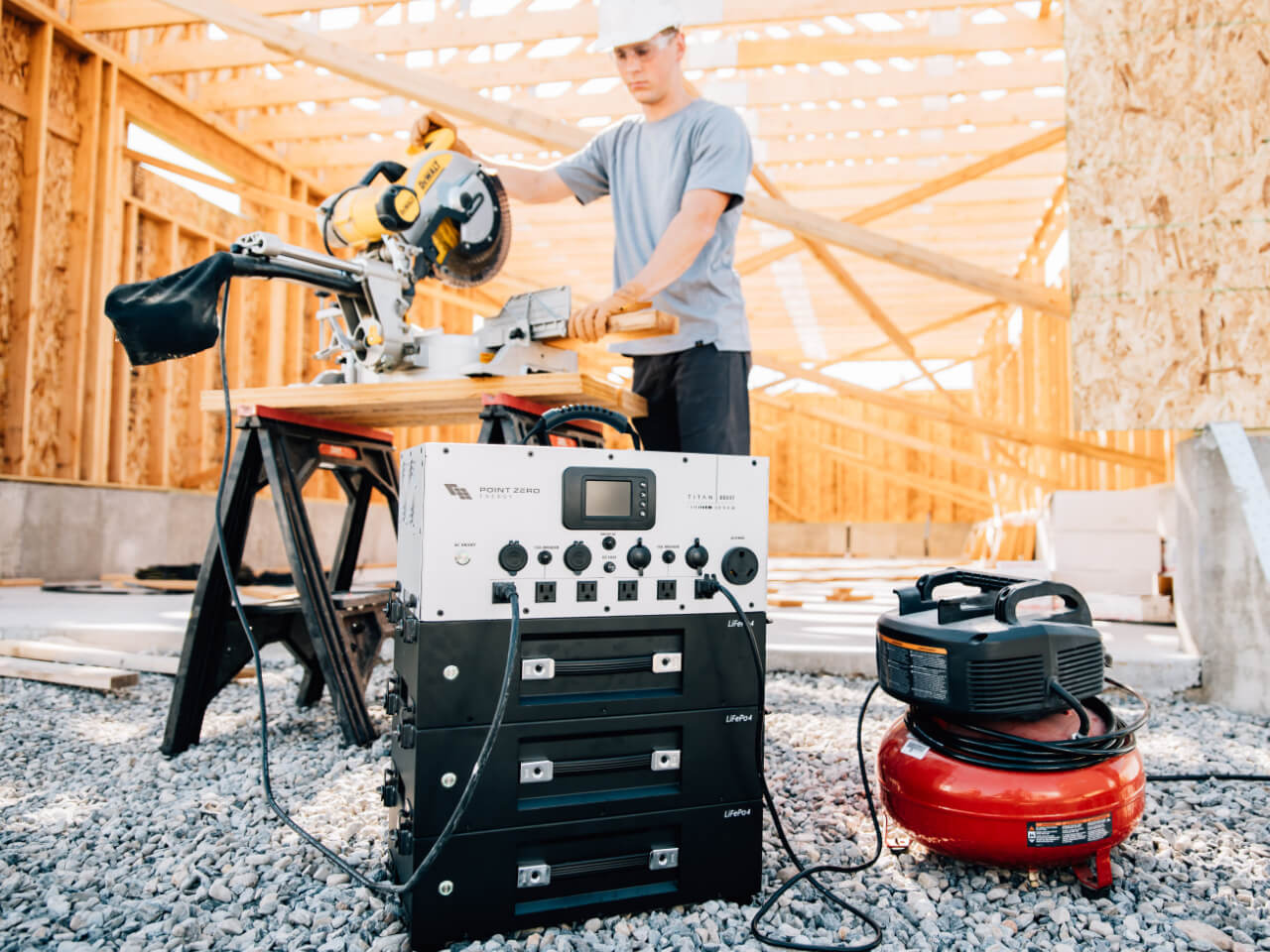
The solar input capacity is an important consideration when choosing a portable solar generator. This capacity refers to how much power the power station can receive from solar panels, which directly affects how fast it can be charged.
If you plan to rely on solar panels as your primary source of charging your portable solar generator, then it’s essential to look for a model with a high solar input capacity. This will ensure that you can charge the solar generator quickly and efficiently, even on cloudy days.
Portable solar generators with higher solar input capacities will charge faster than those with lower capacities. For example, a solar generator with a solar input capacity of 200 watts can be charged in 5 hours by two 100-watt solar panels, while a solar generator with a solar input capacity of only 100 watts would take twice as long to charge with the same panels.
When it comes to choosing a portable solar generator, one of the key considerations is the charging options that it offers. A solar generator with multiple charging options will give you the flexibility to charge it from a variety of sources, which can be useful in different situations.
Of course, the most obvious and popular charging option for solar generators is solar panels. A solar generator with a built-in solar charging capability allows you to charge it using sunlight, making it ideal for outdoor activities or when you’re off the grid. A solar generator with a high solar input capacity, as mentioned earlier, will allow you to charge it quickly using solar panels.
An alternative charging option for portable solar generators is AC outlets. This allows you to charge the solar generator using a traditional wall outlet, which is convenient when you have access to electricity. AC charging is typically the fastest charging option and is ideal when you need to charge your solar generator quickly.
Another charging option for portable solar generators is car chargers. This allows you to charge the solar generator while you’re on the road, making it ideal for camping or road trips. Car charging is typically slower than AC charging, but it’s convenient when you don’t have access to an AC outlet.
When it comes to choosing a portable solar generator for outdoor adventures, portability is a key consideration. You want a unit that is lightweight and compact, making it easy to carry around and transport to different locations.
The weight and size of the solar generator can vary significantly depending on the model, so it’s important to consider your specific needs when choosing a portable solar generator. If you plan to carry the solar generator on your back while hiking or camping, for example, you’ll want to choose a lightweight model that won’t add too much weight to your pack. On the other hand, if you’re traveling by car, you may be able to choose a slightly larger and heavier model.
In addition to the weight and size of the solar generator itself, you’ll also want to consider the size and weight of any accessories, such as solar panels or cables, that you may need to carry with you. Some models come with built-in solar panels, which can be a convenient option if you want to minimize the amount of equipment you need to carry.
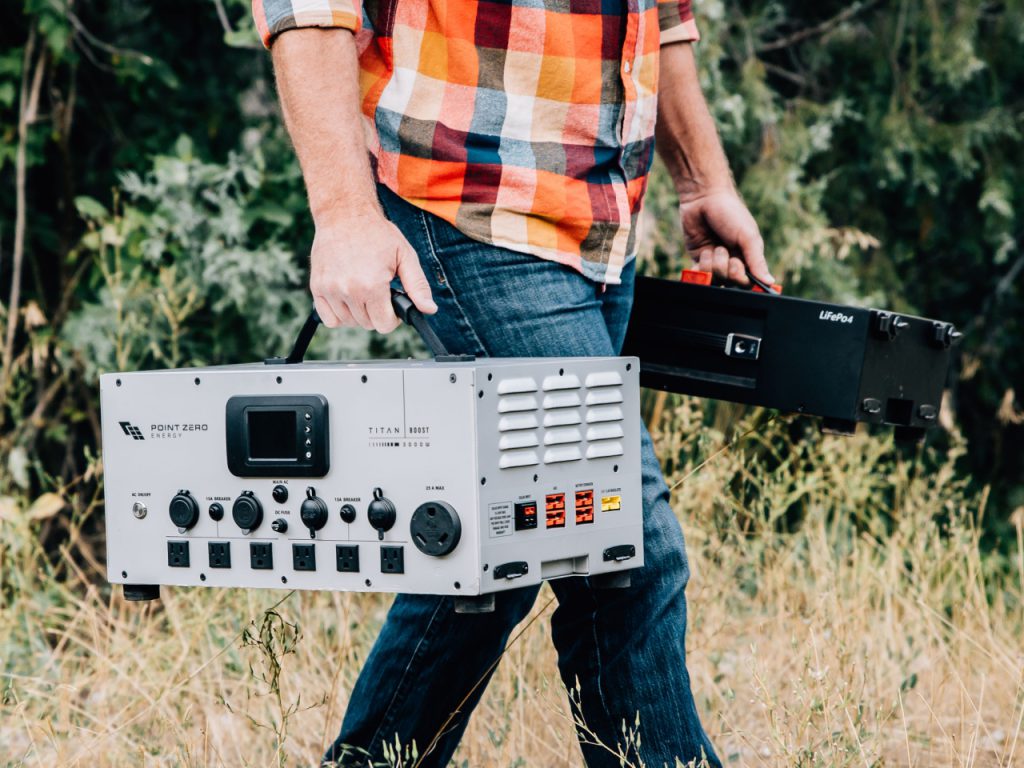
One of the key components of a portable solar generator is the inverter, which converts the DC power from the battery to AC power that can be used to power your devices. The inverter is an important consideration when choosing a solar generator because it determines the type and amount of devices that you can power.
Different devices have different power requirements, which are measured in watts. For example, a laptop may require 60 watts of power, while a small fan may only require 10 watts. When choosing a portable solar generator, it’s important to look for a model with a built-in inverter that matches the power requirements of your devices. The inverter in a portable solar generator is rated in watts, and you’ll want to choose a model that can handle the total power consumption of your devices.
Overall, a built-in inverter is an important component of a portable solar generator, as it determines the type and amount of devices that you can power. Look for a solar generator with an inverter that matches the power requirements of your devices and provides the type of AC output that you need.
When it comes to choosing a portable solar generator, durability and build quality are important factors to consider, especially if you plan to take it on outdoor adventures. Outdoor activities can expose your solar generator to a variety of harsh conditions, including extreme temperatures, moisture, and impacts, so you’ll want a model that can withstand these challenges.
Look for a solar generator with a rugged and durable design that can handle the wear and tear of outdoor use. Models with a tough outer shell made of materials such as aluminum or polycarbonate are often the best choices for outdoor use.
In addition to the outer shell, you’ll also want to consider the quality of the internal components of the power station. Choose a model with high-quality internal components that are designed to last, such as high-capacity batteries and efficient inverters.
One important factor to consider when choosing a portable solar generator is its capacity – how much power it can hold and deliver to your devices. While some models come with a fixed capacity, others are designed with expandability options to increase their capacity if needed.
Many portable solar generators come with expansion ports that allow you to connect additional batteries or solar panels to increase their capacity. By adding extra batteries, you can increase the total amount of power that the power station can hold and deliver to your devices. By connecting additional solar panels, you can increase the rate at which the power station can be charged by solar power.
If you think that you may need to increase the capacity of your portable solar generator in the future, look for a model with expandability options. This will allow you to add additional batteries or solar panels as needed, without having to purchase a whole new power station. It’s important to note that not all portable solar generators are designed with expandability options, so be sure to check the product specifications before making your purchase.
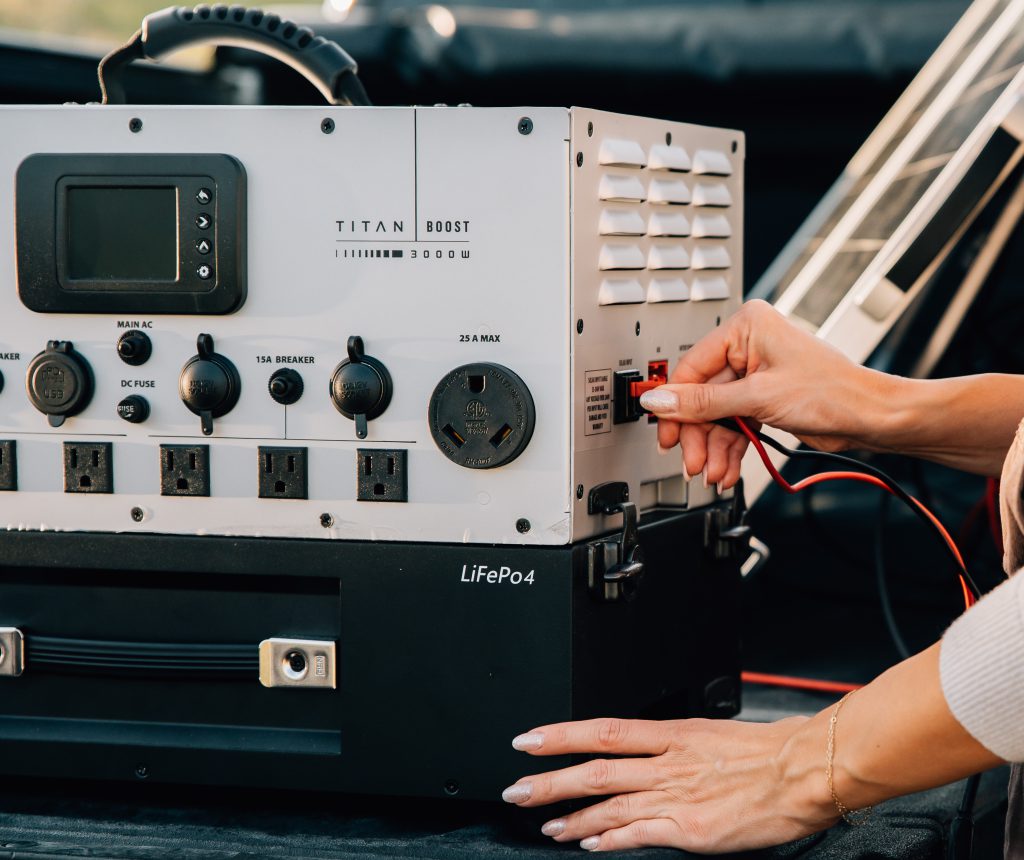
When shopping for a portable solar generator, it’s important to consider both the price and the features of different models to find the best value for your money. While a lower price may be tempting, it’s important to evaluate the overall quality and capabilities of the power station before making a purchase.
To get the most value for your money, consider the total cost of ownership, which includes not only the initial purchase price but also the cost of any additional accessories or solar panels you may need. While some models may have a higher upfront cost, they may come with additional features or be more efficient, ultimately saving you money in the long run.
When shopping for a portable solar generator, it’s important to consider not only the features and capabilities of the product, but also the warranty and customer support offered by the manufacturer. A good warranty and reliable customer support can provide peace of mind, ensuring that you have the support you need in the event of a problem or malfunction.
Look for a model with a comprehensive warranty that covers both the power station and its components. A typical warranty period is one to two years, but some manufacturers may offer longer warranty periods for certain parts or components.
In addition to the warranty, consider the level of customer support offered by the manufacturer. Look for a brand with a reputation for providing responsive and reliable customer support, including technical assistance and troubleshooting.
Some factors to consider when evaluating the customer support offered by a manufacturer include the availability of support channels such as phone, email, and online chat, as well as the quality of the support provided. Look for a manufacturer that offers clear and concise instructions for troubleshooting common issues, as well as a responsive and helpful customer service team.
The Point Zero Energy solar generator boasts a powerful Lithium iron phosphate battery with a capacity of 2,500 watt hours. This makes it one of the largest batteries available in portable solar generators, providing ample energy storage for all your power needs on the go.
One of the key advantages of the Titan’s battery is its ability to store energy for extended periods, making it a great option for anyone who needs portable power in remote locations or without access to traditional power sources. With this kind of energy storage, you can charge the solar generator during the day and then use the stored energy at night, whether you’re camping or RVing.
Durability and longevity are also major benefits of the Titan’s lithium-ion battery. It’s designed to withstand the rigors of outdoor use and has a lifespan of over 15 years, so you won’t have to worry about replacing it anytime soon. This battery’s durability and long life means you can have reliable power and peace of mind for many outdoor adventures to come.
The Titan Boost with only one battery has an output voltage of 120V AC and a continuous power output of 3,000 Watts. With a continuous power output of 3,000 watts, the Titan Boost portable solar generator is capable of powering a wide range of electronic devices. Some examples of what the Titan can power include:
Smart Phone (12W) for 71 hours.
Laptop (50W) for 28.5 hours.
Cook Top Stove (1500W) for 1.2 hours.
Lightbulb (10W) for 77 hours.
42″ TV (100W) for 16 hours.
CPAP Machine (65W) for 86.5 hours.
Microwave (100W) for 1.8 hours.
Refrigerator (71W) for 21.5 hours.
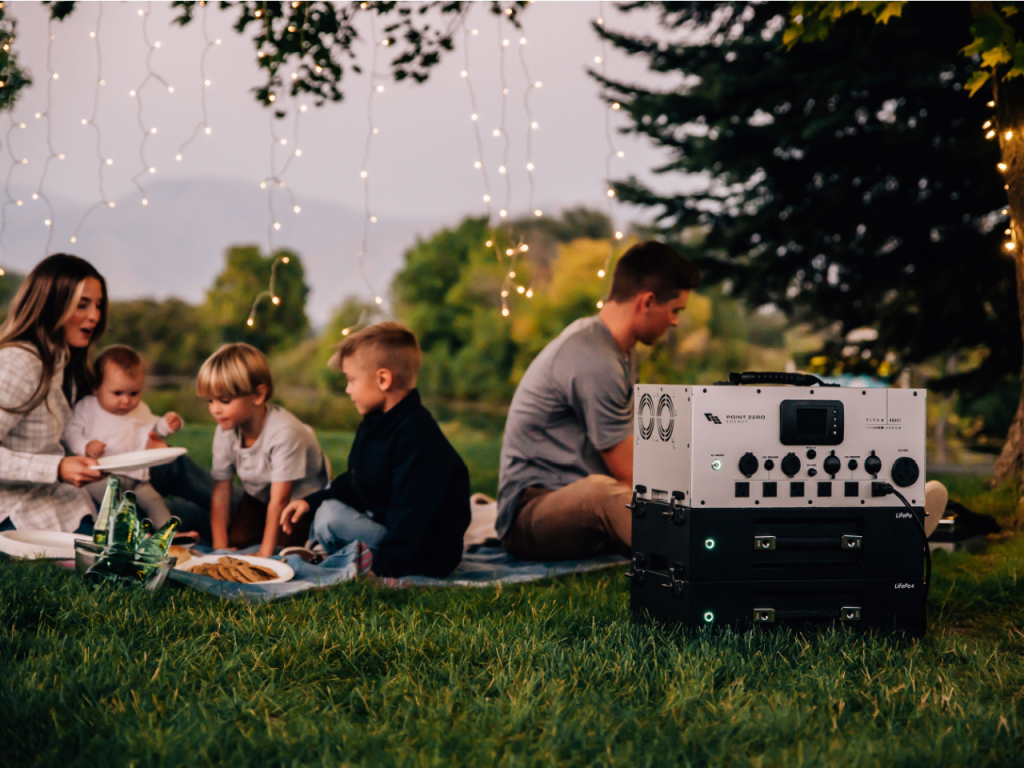
Choosing the right portable solar generator can be a daunting task, but by following these 10 tips, you can find the perfect model for your needs. Whether you’re planning a camping trip or looking for an emergency backup power source, a portable solar generator can provide you with the power you need, anywhere and anytime. So, research, compare, and shop wisely!
The Point Zero Energy team of experts is always available to address any additional questions you may have about solar power stations. Don’t hesitate to reach out to us for further information or clarification. We’re dedicated to providing you with the guidance and support you need to make an informed decision when choosing a portable solar generator. Feel free to send us an email!
